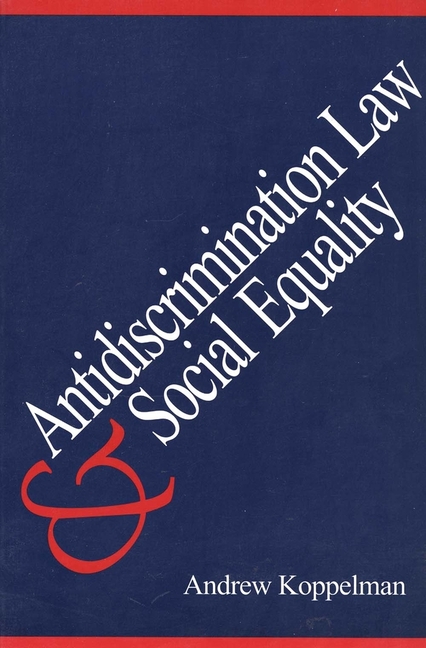Antidiscrimination Law and Social Equality
 Buy the Book: Amazon, Barnes & Noble, Bookshop, Yale University Press
Buy the Book: Amazon, Barnes & Noble, Bookshop, Yale University PressTitle: Antidiscrimination Law and Social Equality
Published by: Yale University Press
Release Date: September 10, 1998
ISBN13: 9780300077254
Overview
This important book addresses head-on the controversy over attempts to reshape society in the name of antidiscrimination. While most Americans understand that racism and similar ideologies are so destructive that the state should do what it can to eradicate them, this understanding conflicts with another widely held idea, that the shaping of citizens' beliefs is not a legitimate objective of a liberal state. Andrew Koppelman argues that the modern conception of antidiscrimination law as a project of cultural transformation is consistent with, and even demanded by, principles of liberty. He clarifies the moral principles that should guide a society in which some groups, such as blacks, women, and homosexuals, are unfairly stigmatized.
Koppelman surveys leading accounts of the evil that antidiscrimination law seeks to remedy, analyzing works by such theorists as Ronald Dworkin, John Hart Ely, Kenneth Karst, Owen Fiss, Alan Freeman, Catharine MacKinnon, and Iris Marion Young. He shows that, while each points to a valuable moral aspiration, none of these aspirations can be realized without cultural transformation, because the central evil that antidiscrimination law seeks to remedy is unjust social devaluation. Koppelman takes up objections from liberal theory, focusing on the works of Robert Nozick, John Rawls, and Bruce Ackerman, and he concludes that liberal principles themselves condemn the corrupting and degrading effects of prejudice and forbid official indifference to those effects. In a final chapter, he addresses the question whether the law should contribute to the transformation of culture by penalizing hate speech and pornography.
Reviews
Winner of the Edward S. Corwin Award given by the American Political Science Association
“A radical and important argument for enlisting the Constitution's anti-discrimination guarantees in the service of cultural transformation. Even those who disagree with Koppelman's vision will be impressed by the elegance of his analysis.”
—Jeffrey Rosen, Legal Affairs Editor, New Republic
“This is the best guide to the philosophical and constitutional questions raised by the culture wars. Koppelman's clarity and insight set a new standard for the debate.”
—Bruce Ackerman, Sterling Professor of Law and Political Science
“It will, no doubt, take its rightful place among the major works in philosophy and law about the evils of discrimination and the rights of individuals in society.”
—from the award citation
"A sharp and subtle analysis. This book sheds valuable new light on the ongoing liberal debate on liberty, equality, and discrimination."
—Michel Rosenfeld, Benjamin N. Cardozo School of Law, Yeshiva University
"The ambitious scope, erudition, and originality of Antidiscrimination Law and Social Equality make it essential reading for anyone who cares about the place of antidiscrimination law in modern society."
—Roderick M. Hills, Jr., Michigan Law Review
"This excellent study of inequality combines boldness and creativity with much careful thinking and detailed scholarship. Asking just what are the most harmful aspects of the inequalities suffered by persons in our society on account of their race, sex, or sexual orientation, Koppelman argues that in all three cases they consist in material disadvantage, stigmatization, and diminished influence on decision-making. Since these inequalities are deeply rooted in our culture, the antidiscrimination project must take on no less than the transformation of culture. Koppelman's valuable discussion of how we should work towards equality should challenge most people and enlighten all."
—Susan Moller Okin, Marta Sutton Weeks Professor of Ethics in Society, Stanford University